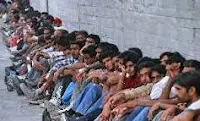The U.N. refugee agency on Friday urged the European Union to grasp a last chance to resolve the refugee crisis next week as the migrant numbers in Europe will build up in coming days and their flows may fragment further into new routes.
UNHCR spokesman Adrian Edwards said a meeting of justice and home affairs ministers on Tuesday and a European Council meeting on Wednesday would be “crucially important.”
“These occasions may be the last opportunity for a positive, united and coherent European response to this crisis. Time is running out,” he told a news briefing.
The UNHCR has been criticized, including by former staffers and humanitarian policy experts, for not being assertive enough in opening doors in Europe, as it has done in past crises, including the exodus from Hungary in 1956.
“The conditions right now in southeast Croatia are seriously worrying. We’ve had 13,000 people at least who have come across as of about 8 or 9 o’clock this morning. There was very little help on hand,” Edwards told Reuters.
He said the European Union had failed to get a grip on a manageable problem. Closing borders had diverted flows of refugees from Hungary, where authorities used tactics that the United Nations has called “callous and xenophobic,” to Croatia.
“If routes become blocked in one place you will unquestionably see people moving to routes elsewhere. We have already seen instances of people arriving in Brindisi in Italy from Turkey. You may see more people coming across on the Libya-Italy route. Closing borders really doesn’t resolve anything at all, it simply pushes it elsewhere.”
Edwards said UNHCR was closely watching the situation in Slovenia, Austria and Croatia, but the pressure could also return to Serbia if migrant numbers back up there.
“As you push people in different directions it becomes much harder to manage because it's going in multiple different routes.”
Asked if UNHCR could help to arrange trains to take refugees straight through Hungary and Austria to Germany, he said UNHCR wanted a collective European response rather than a “gravitation towards one country or two countries where the situation might ultimately become unmanageable.”
Joel Millman, a spokesman for the International Organization for Migration, warned that Europe’s failure to resolve the situation risked returning the continent to the rivalry that led to World War Two.
“It’s very similar to what happened in the 1920s in Europe when the beggar-thy-neighbor policy on trade pitted countries against each other and led to the war. We fear that something similar is happening now with the kind of hardening of borders and as a response to Germany’s decisions.”...
alarabiya.net
18/9/15
UNHCR spokesman Adrian Edwards said a meeting of justice and home affairs ministers on Tuesday and a European Council meeting on Wednesday would be “crucially important.”
“These occasions may be the last opportunity for a positive, united and coherent European response to this crisis. Time is running out,” he told a news briefing.
The UNHCR has been criticized, including by former staffers and humanitarian policy experts, for not being assertive enough in opening doors in Europe, as it has done in past crises, including the exodus from Hungary in 1956.
“The conditions right now in southeast Croatia are seriously worrying. We’ve had 13,000 people at least who have come across as of about 8 or 9 o’clock this morning. There was very little help on hand,” Edwards told Reuters.
He said the European Union had failed to get a grip on a manageable problem. Closing borders had diverted flows of refugees from Hungary, where authorities used tactics that the United Nations has called “callous and xenophobic,” to Croatia.
“If routes become blocked in one place you will unquestionably see people moving to routes elsewhere. We have already seen instances of people arriving in Brindisi in Italy from Turkey. You may see more people coming across on the Libya-Italy route. Closing borders really doesn’t resolve anything at all, it simply pushes it elsewhere.”
Edwards said UNHCR was closely watching the situation in Slovenia, Austria and Croatia, but the pressure could also return to Serbia if migrant numbers back up there.
“As you push people in different directions it becomes much harder to manage because it's going in multiple different routes.”
Asked if UNHCR could help to arrange trains to take refugees straight through Hungary and Austria to Germany, he said UNHCR wanted a collective European response rather than a “gravitation towards one country or two countries where the situation might ultimately become unmanageable.”
Joel Millman, a spokesman for the International Organization for Migration, warned that Europe’s failure to resolve the situation risked returning the continent to the rivalry that led to World War Two.
“It’s very similar to what happened in the 1920s in Europe when the beggar-thy-neighbor policy on trade pitted countries against each other and led to the war. We fear that something similar is happening now with the kind of hardening of borders and as a response to Germany’s decisions.”...
alarabiya.net
18/9/15

No comments:
Post a Comment
ethnologia news only